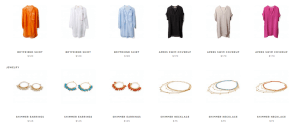![]() It may seem counter-intuitive for an apparel and accessories company to encourage women to buy fewer things, but that’s exactly what a new startup called Cuyana is doing.
It may seem counter-intuitive for an apparel and accessories company to encourage women to buy fewer things, but that’s exactly what a new startup called Cuyana is doing.
Cuyana, a San Francisco startup that makes responsibly sourced, high-end apparel and accessories sold only online, is announcing today that it’s closed on $1.7 million in seed funding from Canaan Partners to scale out its company. Cuyana currently has a full-time staff of five along with 10 part-timers, which will likely grow in the months ahead.
Also today, Cuyana is kicking off what it’s calling the “Lean Closet” movement: Customers who buy Cuyana items will also receive a bag in which to put unwanted items from their own closets to send back to the company in exchange for store credit. Cuyana will then donate those items to nonprofits.
The idea, Cuyana co-founders Karla Gallardo and Shilpa Shah told me in an interview this week, is to encourage women to pare down their closets to only include well-made things that they actually love — such as the things Cuyana makes (of course.) “We create premium quality collections from around the world with a minimalist design that will last forever, and pieces you can wear every day,” Gallardo said. “The result is having a lean closet, which allows you to have a life free of clutter.”
It’s an idea that is not exactly new — wealthy women have stocked their closets with timeless classics from the likes of Alaia and The Row and Celine for years — but Cuyana says it’s bringing well-made ethically produced items from places like Peru and Argentina to a new price point, with bags that cost around $160 instead of around $900. 
That’s enabled by, you guessed it, technology — Cuyana is online only, and has structured its own supply chain to be much faster than typical luxury retail brands. “We are able to pass those savings on to the customer,” Gallardo says.
The strategy so far is working quite well. Since launching last year, Cuyana has seen 30 percent of its customers return for a second or third purchase, with only a one percent rate of returning items. Pinterest has been a huge marketing channel for the brand. “Often when you see a beautiful product on Pinterest, you click through and you end up on a really expensive luxury brand,” Gallardo said. “With us, people click through and see a price they can actually afford.”
Another nice thing is how Cuyana focuses on the story behind where each product is made. The company’s website can be browsed by region, and the visitor can really delve into the process behind the manufacturing of each object, whether it’s a pair of earrings in Turkey or a scarf made in Peru. It’s refreshing to see this kind of transparency from e-commerce brands such as Cuyana and Everlane, after years of traditional retailers often trying their best to hide the often shameful details on how their products are made.